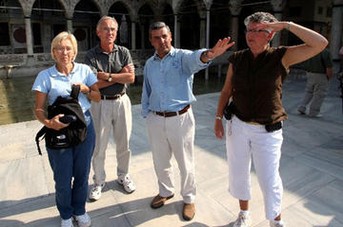John Veverka & Associates
Main menu:
- Home Page
- Our Range of Services
- Interpretive Coaching
- Interpretive Planning
- Interpretive Plan Outline
- Interpretive Training
- John Veverka Resume
- NEW Advanced Interp. Text Book
- InterpNEWS
- Library
- JVA NEWS, Courses and Updates
- Certificates
- Planning/Design of Interpretive Panels
- Interpretive Writing
- Interpretive Writing Course
- Interpretive Trails Course
- Interpretive Panels Course
- Introduction to Heritage Interpretation Course
- Interpretive Planning & Design of Marketing Brochures Course
- Training for Interp. Trainers
- Interpretive Exhibits Course
- Interpretive Master Planning Course
- Interpretive Planning for Scenic Byways.
- Critiquing and Coaching Interpretive Staff
- Advanced Interpretive Planning
- Interpretive Training Center Course Catalogue
- Interp. for International Visitors course.
- Interpretive Exhibits Evaluation
- Interp. Center Feasibility Analysis Course.
- Interp. for Commercial Tour Providers
- Interpretive Researchers Guide for Visitor Studies
- Interp. Planning for Historic Homes
- Heritage Interpretation Training Center
- Interpretive Planning for Botanical Gardens
- An introduction to planning and presenting live interpretive programs and tours for Museum/Heritage Site Docents and Volunteers.
- Developing Marketing Plans for Heritage & Tourism Sites and Attractions
- Interpretation Book Store
- Heritage Interpretation Resource Center
- Interpretive Planning for Historic Farms
- Developing Successful Partnerships
- Developing Interpretive Outreach Programs
- Community Interpretation Planning
- Interpreting Gravestones and Historic Cemeteries
- Using Interpretation to Accomplish Management Objectives.
- An Interpreters Guide for Survival Economics.
- Innovative Strategies for Interpretive Media and Services Planning.
- A Curators Guide for Developing Gallery Tours.
- Advanced Interpretive Writing - Technical Publications
- Advanced Interpretive Services for Managers, Supervisors, Team Leaders and Sr. Staff.
- Advanced Interpretation for Chiefs of Interp. - Interpretive Managers - Regional Interp. Specialists
- Interpreting Critical Issues.
- Developing Commercial Interpretation for Resorts, Cruise Ships, Campgrounds and Tourism Attractions.
- Planning and developing a new commercial tour guiding business.
- Interpretive Evaluation, Visitor Studies and Site Assessment Center
- The Center for Interpretive Planning Advancement & Excellence.
- Developing Requests for Proposals (RFPs)
- Planning and Facilitating Focus Workshops
- Planning for Interpretive Experiences
- 40 Years a Heritage Interpreter
- Interpretive Techniques - The Rest of the Story Course
- Certified Professional Interpretive Planner Certificate
- Certified Professional Interpretive Program
- Certified Professional Interpretive Writer certificate program.
- Visitor motives for attending interpretive programs.
- Exhibit Rehab Course
- Developing Training Workbooks & Manuals
- Planning for Railroad Museums and Sites.
- Climate Change Interpretation Course.
- When there's nothing left but the story - interp. storytelling.
- Interpreting Legends Myths and Fables
- InterpSHARE - Seminars 2022
- Interpreting Invasive Species
- Interpretiing Edible Insects
- Interpretaive Planning for Climate Change
- HITC Climate Crisis Resource Center
- PUP Members Only
- Starting a new Interp Consulting Business
- Panels 4 Week Course
- Interpretive Writing - 4 Week Course
- Marketing - 4 Week Course
- Intro to Interpretation - 4 Week Course
- Interp Climate Change - 4 Week Course
- Exhibit Rehab 4-Week Course
- Level 1
- Johns Interpreters Blog
- John Interpreters Blog 2
Interp. for International Visitors course.

Interpretive Program Presentations and Protocol for
Interacting and Communicating With Your International Visitors.
An interpretive training short course.
Nine Units - 1 CEU Credit.
With a multitude of international visitors coming to and experiencing our heritage sites, it would be valuable for interpreters to be aware of the differences that exist between our own customs and those of our international visitors.
This short "sensitizing" course is designed to provide you with an overview in developing and offering interpretive programs and media, from multi-lingual interpretive media (use of mass customization design), to general protocols such as use of first names, eye contact, gestures and other verbal and non-verbal communication techniques and their possible "double meaning" to different cultures.

What this really means and where...
USA - everything is fine - a-ok.
France = you're a zero
Japan = Please give me coins!
Brazil = an obscene gesture.
Spain = An obscene gesture.
There is a lot to learn about our international visitors and successful communication with them. Having worked in a lot of different countries, I had to learn from friends and partners what are the customes and proper protocol to use. I hope this short course will give you some advantages I had to learn along the way.
Course Instructor:
Prof. John Veverka
- B.S and M.S in Heritage Interpretation - The Ohio State University
- Ph.D. program in Interpretation at Michigan State University.
- Adjunct Professor Heritage Interpretation (summer heritage tourism institutes) North
Carolina State University, New York State University.
- NAI Certified Interpretive Planner and Trainer
- NAI Fellow
- Certified Professional Heritage Interpreter (Canada).
- Author of several interpretive planning/training college text books.
- Publisher of InterpNEWS - the International Heritage Interpretation e-Magazine.
- 40 years of interpretive planning, training and critiquing experience.
Course Units
Unit One - Introduction and Cultural Sensitivity.
Unit Two - General Do's and Taboos.
Unit Three - General Protocol Topics (Punctuality, body contact, first names, eye contact and more).
Unit Four - Verbal and non- verbal communications.
Unit Five - Forms of address when meeting international visitors or proper introductions.
Unit Six- Gestures (one we might use for a greeting might also be an insult in some countries.)
Unit Seven - an overview of Countries, Customs and Cultures (for your international visitors).
Unit Eight - Hospitality Protocol (who sits where?).
Unit Nine - Mass Customization and Markets of One - having interpretive media available in multiple languages.
-------------------------------------------------
For our e-LIVE courses, all assignments from each unit will be sent to Prof. Veverka for reveiw and comments or coaching. You can talk with John whenever you need to by phone, SKYPE, or e-mail. John will be YOUR personal coach for this course.
When will the course start? You can start this course at any time and work at your own pace. It is estimated that it will take about 10 hours to complete this short course. The tuition for the 10 hours of training is $100.00 USD, which can be paid for by credit card or PayPal. At the completion of the course you will receive a certificate of completion noting the CEU credit on the certificate.
If you're interested in this course and would like to enroll in it - send an e-mail to John at: jvainterp@aol.com for a registration form. Then return here to pay your tuition and get started.
If you have any questions at all feel free to ask.
Prof. John Veverka
JVA Heritage Interpretation International Training Center
Interpretive Training Division